試す 金 - 無料
Flocking Back To Wool
Australian Geographic Magazine
|July-August 2018
When our Test cricketers run onto the pitch they wear wool grown in the Flinders Ranges of South Australia. The region’s hardy flocks and their enterprising producers provide a neat snapshot of today’s Australian wool industry.

IN THE STONY COUNTRY east of Jamestown, in southern South Australia, sheep paddocks are as big as skies. It’s dry here, beyond Goyder’s Line, which indicates reliable rainfall and separates cropping and grazing lands.
Summer is bearing down, forcing Geoff Power to begin hand-feeding the 3000 sheep on his 5040ha property, Sambas. “They’re all on natural pastures,” he says, “but we got no winter rain and the kangaroos have been killing us.”
In an industry steeped in tradition, Geoff is something of a stray. He grew up in Melbourne, with no farm experience or wool connections. “It was always my dream, ever since I was a little fella, to grow wool,” he says. “It’s taken 50 years to get to where we are today, slowly accumulating land and sheep. It’s a challenge when the weather is out of your control, dogs are on the prowl, there are animal welfare issues to deal with and fashions change 16 times a year. But I love sheep and wool is such a versatile product.”

Even Geoff ’s dedication, though, was tested by the Millennium Drought, which lasted from 2001 to 2009. With wool prices flat-lining and sheep carcasses worth little more, he decided something had to change. The wool that other Flinders Ranges growers were producing was clean and green, yet synthetic fibres had a stranglehold on the textiles industry internationally.
“At the end of the day, wool is a commodity and we needed to find a point of difference,” says Geoff, the former president of livestock SA. “For us, that was where and how we grow that wool in an ethical and sustainable manner.”
このストーリーは、Australian Geographic Magazine の July-August 2018 版からのものです。
Magzter GOLD を購読すると、厳選された何千ものプレミアム記事や、10,000 以上の雑誌や新聞にアクセスできます。
すでに購読者ですか? サインイン
Australian Geographic Magazine からのその他のストーリー
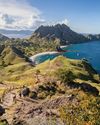
Australian Geographic Magazine
SULAWESI SENSATIONS
There are worlds within worlds and marvels untold waiting to be experienced on Indonesia's remote islands.
9 mins
September-October 2024
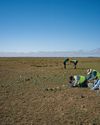
Australian Geographic Magazine
SEARCHING FOR AUSSIE DINOSAURS
Our understanding of where to find ancient life in Australia has been turned on its head by a new appreciation of the country's geology. Now the world is looking to our vast outback as the latest hotspot to locate fossils.
18 mins
September-October 2024
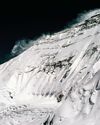
Australian Geographic Magazine
THE HARDEST NIGHT
The first Australian ascent of Mt Everest in 1984 is one of the great feats of mountaineering. Climbed by a small team semi-alpine style, with no bottled oxygen, via the Great (Norton) Couloir, it remains unrepeated 40 years later.
14 mins
September-October 2024
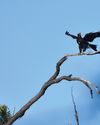
Australian Geographic Magazine
WEDGE-TAILED WONDER
The chance discovery of an eagle nest leads to an extended vigil observing normally hidden behaviours of one of nature's supreme winged marvels.
3 mins
September-October 2024
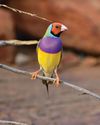
Australian Geographic Magazine
BURDENED BY BEAUTY
Northern Australia's Gouldian finch survives in huge numbers in cages around the world, but its wild population continues to struggle.
4 mins
September-October 2024
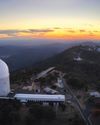
Australian Geographic Magazine
A TELESCOPE FOR A GOLDEN AGE
After a stellar 50 years as one of the country's major scientific assets, the AAT continues to play a major role in keeping Australian astronomy on the world stage.
7 mins
September-October 2024
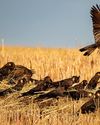
Australian Geographic Magazine
COCKY WHISPERING AT COOMALLO CREEK
This patch of remnant bush on the edge of the West Australian wheatbelt is a place loved by one of Australia's rarest bird species and the man who has studied the site for more than 50 years.
6 mins
September-October 2024

Australian Geographic Magazine
A PIONEERING PAIR
Louisa Atkinson and her mother, Charlotte, were among Australia's earliest authors, and pioneers in women's rights.
9 mins
September-October 2024
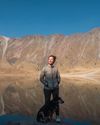
Australian Geographic Magazine
THE LONGEST WALK
Lucy Barnard is walking from Argentina to Alaska -the length of the Americas - on an extraordinary journey of endurance and adventure.
6 mins
September-October 2024
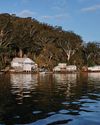
Australian Geographic Magazine
SECLUDED, BUT NOT ALONE
In an era of heightened social isolation, where many of us lead lonely lives, Dangar Island offers the chance to be part of a supportive, connected community.
7 mins
September-October 2024
Translate
Change font size
